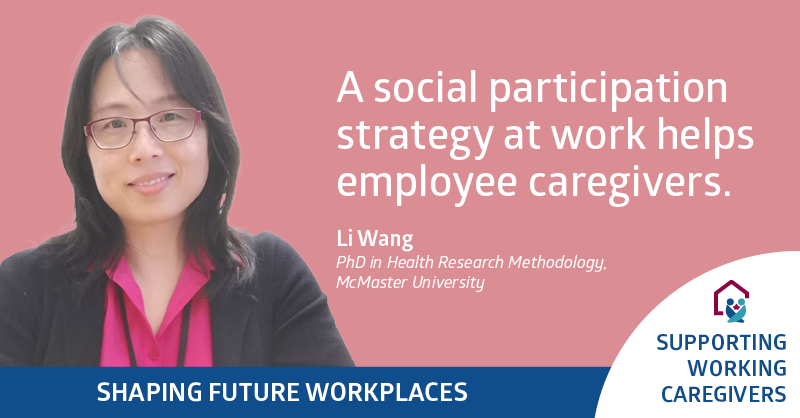Social participation and depressive symptoms of carer-employees of older adults in Canada: a cross-sectional analysis of the Canadian Longitudinal Study on Aging
We wanted to assess whether social participation by carer-employees had any modifying or protective effect on their depressive symptoms.
This study used two waves of data from the Canadian Longitudinal Study on Aging (CLSA) to investigate the association between social participation and depressive symptoms in carer-employees (CEs) and non-carer-employees (NCEs).
Carer-employees simultaneously balance paid work and unpaid caring demands. CEs significantly contribute to the health care system by providing a substantial amount of unpaid care. Their workplace participation provides both financial and social support to their unpaid caring role. However, work stress can compound with stress due to caring, leading to negative outcomes, particularly for women.[i] Due to caring responsibilities and paid work, CEs often must miss opportunities for social participation, giving up hobbies and recreational activities. This can lead to enhanced strain, depression, and feelings of isolation, as well as limited time alone with family.[ii] Consequently, it is important to understand whether carers’ social participation exhibits any modifying or protective effect on their depressive symptoms.
In this study, we examined the caring role on depression within a sample of Canadians active in the labour market. The primary objective was to understand the linkages among caring, social participation and depressive symptoms among Canadian employees using parallel analysis of two waves of the CLSA, controlling for a range of possible confounders.
We used the Baseline Tracking Dataset version 3.4 of the CLSA[iii] that includes 21,242 Canadian men and women between the ages of 45 and 85 at the time of recruitment; 17,053 participants were retained in the follow-up 1 Tracking Dataset version 1.0.
CEs were more likely to report higher depressive symptoms compared with non-CEs in both waves. However, there was no significant difference in depressive symptoms between CEs and non-CEs in Wave 1. In Wave 2, CEs experienced significantly greater depressive symptom scores, reflecting the impact of long-term caregiving.
The findings from this study have important policy implications. CEs inevitably experience role conflict, affecting their time and energy. A social participation strategy available for many who continue to be employed is the adoption of carer-friendly workplace programs (CFWPs). These include a range of workplace initiatives, such as: carer support groups, education and training seminars addressing topics of interest to CEs, a CE peer-support program, and specialized training for supervisors and managers to better understand the needs of CEs, as well as interventions to support a carer-friendly work-place culture.[iv] [v]
Our study provides the evidence needed to ensure that CEs remain socially engaged, via social participation.
References
[i] Williams, A. M., Tompa, E., Lero, D. S., Fast, J., Yazdani, A., & Zeytinoglu, I. U. (2017). Evaluation of caregiver-friendly workplace policy (CFWPs) interventions on the health of full-time caregiver employees (CEs): Implementation and cost-benefit analysis. BMC Public Health, 17(1), 728.
[ii] Wang, L., Williams, A., & Kitchen, P. (2018). Health of caregiver-employees in Canada. International Journal of Workplace Health Management, 11(5), 382–394. https://doi.org/10.1108/IJWHM-04-2018-0043.
[iii] Publication and Promotion Policy for CLSA Approved Users. https:// www.clsaelcv.ca/doc/2579. Assessed October 8, 2021.
Raina, P., Wolfson, C., Kirkland, S. A., Griffith, L. E., Oremus, M., Patterson, C., Tuokko, H., Hogan, D., Wister, A., Payette, H., Brazil, K., & Shannon, H. (2009). The Canadian longitudinal study on aging (CLSA). Canadian Journal on Aging, Special Issue on the CLSA, 28(3), 221–229. https://doi.org/10.1017/S071498080 9990055
[iv] Ibid.
[v] Ireson, R., Sethi, B., & Williams, A. (2018). Availability of caregiver-friendly workplace policies (CFWPs): An international scoping review. Health & Social Care in the Community, 26(1), e1–e14.
ABOUT THE PROJECT
Carers Canada is leading the knowledge mobilization activities for a multi-sectorial research program to spread and scale a carer-friendly workplace standard, known as the Carer-Inclusive and Accommodating Organizations’ Standard (CSAB701-17). Led by Dr. Allison Williams, CIHR Research Chair in Gender, Work and Health at McMaster University, the research program consists of six inter-related sub-projects that will: increase awareness of the standard across Canada; evaluate readiness to change; determine feasibility and cost benefit; embrace cultural competency; consider Indigenous perspectives; and create an international standard. Visit PARTNERSHIP PROJECT SITE here

CIHR/SSHRC Healthy Productive Work Partnership Grant “Scaling up the Career Inclusive Accommodating Organizations Standard” FRN: HWP-146001 (CIHR); 890-2016-3018 (SSHRC).
 Li WangFebruary 17, 2022
Li WangFebruary 17, 2022

Social participation and depressive symptoms of carer-employees of older adults in Canada: a cross-sectional analysis of the Canadian Longitudinal Study on Aging
We wanted to assess whether social participation by carer-employees had any modifying or protective effect on their depressive symptoms.
This study used two waves of data from the Canadian Longitudinal Study on Aging (CLSA) to investigate the association between social participation and depressive symptoms in carer-employees (CEs) and non-carer-employees (NCEs).
Carer-employees simultaneously balance paid work and unpaid caring demands. CEs significantly contribute to the health care system by providing a substantial amount of unpaid care. Their workplace participation provides both financial and social support to their unpaid caring role. However, work stress can compound with stress due to caring, leading to negative outcomes, particularly for women.[i] Due to caring responsibilities and paid work, CEs often must miss opportunities for social participation, giving up hobbies and recreational activities. This can lead to enhanced strain, depression, and feelings of isolation, as well as limited time alone with family.[ii] Consequently, it is important to understand whether carers’ social participation exhibits any modifying or protective effect on their depressive symptoms.
In this study, we examined the caring role on depression within a sample of Canadians active in the labour market. The primary objective was to understand the linkages among caring, social participation and depressive symptoms among Canadian employees using parallel analysis of two waves of the CLSA, controlling for a range of possible confounders.
We used the Baseline Tracking Dataset version 3.4 of the CLSA[iii] that includes 21,242 Canadian men and women between the ages of 45 and 85 at the time of recruitment; 17,053 participants were retained in the follow-up 1 Tracking Dataset version 1.0.
CEs were more likely to report higher depressive symptoms compared with non-CEs in both waves. However, there was no significant difference in depressive symptoms between CEs and non-CEs in Wave 1. In Wave 2, CEs experienced significantly greater depressive symptom scores, reflecting the impact of long-term caregiving.
The findings from this study have important policy implications. CEs inevitably experience role conflict, affecting their time and energy. A social participation strategy available for many who continue to be employed is the adoption of carer-friendly workplace programs (CFWPs). These include a range of workplace initiatives, such as: carer support groups, education and training seminars addressing topics of interest to CEs, a CE peer-support program, and specialized training for supervisors and managers to better understand the needs of CEs, as well as interventions to support a carer-friendly work-place culture.[iv] [v]
Our study provides the evidence needed to ensure that CEs remain socially engaged, via social participation.
References
[i] Williams, A. M., Tompa, E., Lero, D. S., Fast, J., Yazdani, A., & Zeytinoglu, I. U. (2017). Evaluation of caregiver-friendly workplace policy (CFWPs) interventions on the health of full-time caregiver employees (CEs): Implementation and cost-benefit analysis. BMC Public Health, 17(1), 728.
[ii] Wang, L., Williams, A., & Kitchen, P. (2018). Health of caregiver-employees in Canada. International Journal of Workplace Health Management, 11(5), 382–394. https://doi.org/10.1108/IJWHM-04-2018-0043.
[iii] Publication and Promotion Policy for CLSA Approved Users. https:// www.clsaelcv.ca/doc/2579. Assessed October 8, 2021.
Raina, P., Wolfson, C., Kirkland, S. A., Griffith, L. E., Oremus, M., Patterson, C., Tuokko, H., Hogan, D., Wister, A., Payette, H., Brazil, K., & Shannon, H. (2009). The Canadian longitudinal study on aging (CLSA). Canadian Journal on Aging, Special Issue on the CLSA, 28(3), 221–229. https://doi.org/10.1017/S071498080 9990055
[iv] Ibid.
[v] Ireson, R., Sethi, B., & Williams, A. (2018). Availability of caregiver-friendly workplace policies (CFWPs): An international scoping review. Health & Social Care in the Community, 26(1), e1–e14.
Li Wang is a PhD in Health Research Methodology at McMaster University with a master’s degree in Statistics. Her research focuses on the determinants of health and health service utilization, specializing in children’s mental health, as well as the health and wellbeing of caregiver-employees.
FAVORITE PASTIME: Dancing, singing, and hiking.
LinkedIn: @li-wang-b683a195
ABOUT THE PROJECT
Carers Canada is leading the knowledge mobilization activities for a multi-sectorial research program to spread and scale a carer-friendly workplace standard, known as the Carer-Inclusive and Accommodating Organizations’ Standard (CSAB701-17). Led by Dr. Allison Williams, CIHR Research Chair in Gender, Work and Health at McMaster University, the research program consists of six inter-related sub-projects that will: increase awareness of the standard across Canada; evaluate readiness to change; determine feasibility and cost benefit; embrace cultural competency; consider Indigenous perspectives; and create an international standard. Visit PARTNERSHIP PROJECT SITE here

CIHR/SSHRC Healthy Productive Work Partnership Grant “Scaling up the Career Inclusive Accommodating Organizations Standard” FRN: HWP-146001 (CIHR); 890-2016-3018 (SSHRC).